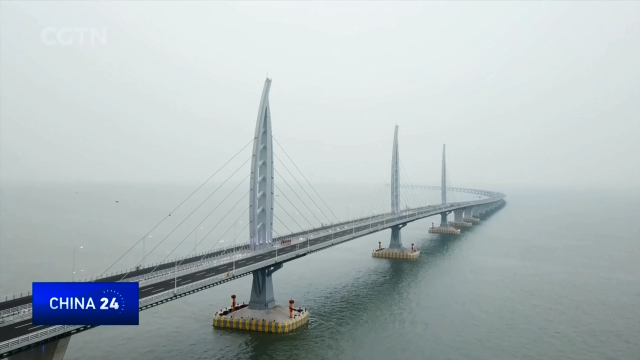
21:04, 15-Aug-2018
Navigating the Greater Bay Area: Calls rise for better infrastructure between Guangdong, HK and Macao
Updated
20:45, 18-Aug-2018
02:43

A new high-speed railway. The world's longest cross-sea bridge. Moving in the Greater Bay Area is about to get even easier. But some say it's still not enough, and that a lot of improvements are still needed before it can be called a "World Class Bay Area". CGTN's Mark Fontes explains.
Guangzhou's South Station is one of the largest, most modern train stations in the world. It's from where He Weiran and millions of others begin their commute every day, to other southern cities, such as, Zhongshan, Zhuhai, and Macao.
HE WEIRAN COMMUTES TO ZHONG SHAN "It's a convenient ride. It's more like a subway now than a train. It can also take more passengers, but it is still a little crowded."
PENG CAIPING GOING TO ZHUHAI "As a passenger, I definitely hope the train can be even faster and more convenient."
WEI JING GOING TO ZHUHAI "As fast as possible of course. I go to Zhuhai quite often."
MARK FONTES GUANGZHOU-ZHUHAI RAILWAY "This ride between Guangzhou and Zhuhai takes about an hour. In the very near future, the ride between Guangzhou, Shenzhen and then eventually Hong Kong will take even less than that. Experts say despite the improvements, they still don't consider this a World Class Bay Area."
The Hong Kong-Zhuhai-Macao Bridge - the world's longest cross-sea span - will open to traffic in the coming weeks. This fall, thanks to the new high-speed railway, travel time between Guangzhou and Hong Kong will be reduced to just 48 minutes. However, experts say Guangdong province remains the area's weak link with the vast majority of its major cities requiring more efficient access to Hong Kong and Macao, so as to create what they call a "one-hour life circle" throughout the Greater Bay Area. But this is something authorities are trying to remedy.
WANG FUMIN GUANGDONG TRANSPORTATION DEPARTMENT "Construction is underway on the Shenzhen-Zhongshan Tunnel, Humen's second major bridge, and the Lianhua Mountain Bridge. We're also about to start building the Shiziyang and Lingdingyang Tunnels. These will help modernize the area's transportation network."
Guangdong's 8,300-plus kilometers of existing expressways are already more than any other Chinese province. The Greater Bay Area plan is expected to call for innovative and green infrastructure projects, along with economic and trade cooperation between Guangdong, Hong Kong and Macao.
WANG FUMIN GUANGDONG TRANSPORTATION DEPARTMENT "We have built the world's most intensive road and railway networks. We have three of the world's ten busiest ports, five major airports, and are laying a solid foundation for future development."
The Greater Bay Area remains one of the world's fastest growing bay areas, a trend that is expected to continue for years to come. Mark Fontes, CGTN, Guangzhou.

SITEMAP
Copyright © 2018 CGTN. Beijing ICP prepared NO.16065310-3
Copyright © 2018 CGTN. Beijing ICP prepared NO.16065310-3